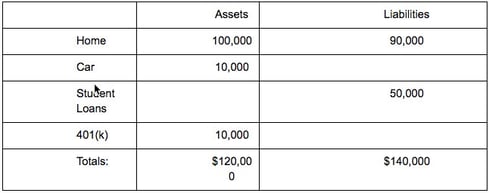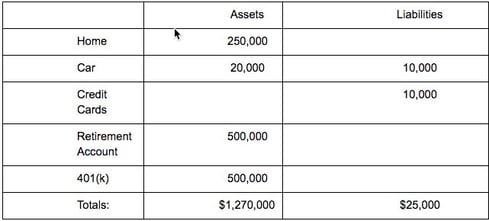
Your net worth is a figure that can be useful in putting together your budget and determining how close you are to reaching your financial goals. It’s a snapshot of your overall financial picture – your assets (things you own) minus your liabilities (debts you owe.) While it can sound intimidating, you can determine your net worth in three steps:
1. Make a list of your assets and their worth.
2. Make a list of your liabilities.
3. Subtract your liabilities from your assets.
The more accurate your lists of assets and liabilities, the more accurate your calculated net worth will be.
Examples:
Here are two simple examples and reflect two different life stages – someone just starting out and someone close to retirement.
Joe
Joe is fairly young and just getting started. He has purchased a home that’s worth $100,000, and he owes $90,000 on his mortgage. His $10,000 car is paid off, but he does owe $50,000 in student loans. He has saved $10,000 in the 401(k)-plan offered by his employer, but that’s his only savings.

Assets – Liabilities = Net Worth
$120,000 – 140,000 = -$20,000
Joe has a negative net worth of $20,000.
Jane
Jane has been working for several years and hopes to retire soon. She owns a home that’s worth $250,000 and has been able to pay off her mortgage. She recently signed for a $10,000 loan on a car that’s worth $20,000. She has $10,000 in credit card debt. She has $500,000 in a retirement account and an additional $500,000 in her 401(k).

Assets – Liabilities = Net Worth
$1,270,000 – 25,000 = $1,245,000
Jane has a net worth of $1,245,000
What does this mean?
While everyone would like to have a positive net worth, you probably shouldn’t worry too much if yours is negative, especially if you're just getting started. Your net worth will increase as you pay down debt and save money. However, a negative net worth can be a sign of over-borrowing, which indicates that you need to focus on paying down your debt. (As your debt decreases, your net worth will increase.) This is something you should track every month to insure you’re on the right track with your savings plan.
If you have questions about your net worth, visit one of our banking centers and ask to speak with a Personal Banker. They can help point you in the right direction. It can take some discipline, but increasing your net worth is possible.
The views, information, or opinions expressed in this article are solely those of the author and do not necessarily represent the views of Citizens State Bank and its affiliates, and Citizens State Bank is not responsible for and does not verify the accuracy of any information contained in this article or items hyperlinked within. This is for informational purposes and is no way intended to provide legal advice.